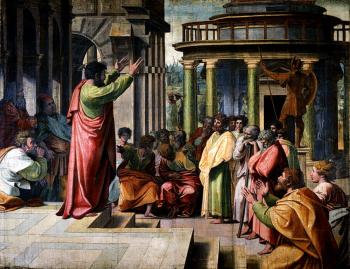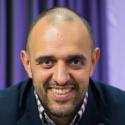2026 Apologetics (Advanced) Network
- Image

What did the Apostle Paul do when Pre-Christian Europe was pagan, relativistic, and pluralistic? He did apologetics among his contemporaries; Paul went to the Jews arguing from the Old Testament Scriptures that Jesus was the Christ and to the pagan Greeks using their literature and cultural artifacts to argue that the "unknown God" has been revealed and proclaimed in Jesus.
21st century Europe is in a state very similar to Paul's time and needs gifted apologists who can demonstrate that Christianity is true and relevant. Therefore, the vision of the European Apologetics Network is to train a new generation of apologists who can stand in today's marketplace of ideas in the way that Paul did in his generation. Our desire is to develop apologists who will testify to the truth of the Gospel with wisdom, versatility, and courage in their efforts to persuade their contemporaries.
The Advanced Apologetics Network has been formatted to function as an interactive learning experience that flows with a common theme. Based on participants’ feedback, the new format will provide three essential components to support apologetic endeavor in Europe:
- Knowledge: Network participants will learn from leading apologists, philosophers, and scientists, being equipped to engage some of the crucial issues of our time with fresh perspectives.
- Skills: Our updated format includes an emphasis on practical skills development. Participants will be challenged to put into practice what they've learned in interactive formats, including developing arguments and content ideas.
- Community: By joining the Network, participants become part of a community of apologists. The new Network design will provide opportunities to connect with like-minded Christians, exchange know-how, and work together on future collaborations. We envision that this community will continue throughout the year online.
What Network Participants Are Saying
- "Being at ELF was so helpful for me because I had the ability to learn from faithful and experienced leaders. I learned how to approach unbelievers in a friendly and biblically faithful way in cultural apologetics. Also, I learned valuable ways to equip church members to share the gospel with their friends in their neighborhoods and workplaces." - Zsolt Kapitany, Pastor of Pestszentimre Baptist Church, Hungary
- "Being at the European Leadership Forum is so exciting and encouraging. I had the amazing opportunity to meet experienced academics and apologists, gifted speakers, devoted Christians, and faithful brothers and sisters in Christ. The information and knowledge I received through the Apologetics Network are of great help to me, challenging me to invest in my training, abilities, and calling."
- Teodor Colda, Vice Academic Dean of Baptist Theological Institute, Romania - "The European Leadership Forum has become like an elder brother who holds the hand of a toddler and teaches them to work. I started experiencing the benefits of the Forum last year with the Year-Round Mentoring program, where I was able to share the challenges of my context with my mentor; he helped me to find tangible solutions to my problems. I have now received encouragement from leaders from all over the world in the Apologetics Network and can say that I am now encouraged to keep serving God, knowing that I am not alone."
- Danson Ottawa, National Coordinator of Africa Center for Apologetics Research, Kenya
Applicants should be those with evangelistic or apologetic gifts who have first attended the European Apologetics Network: Foundational Track and the European Evangelism Network. The purpose of the Network is to train, mentor, equip, and resource those evangelists and apologists who are seeking to communicate the Gospel in their local communities. Prior preparation will be set for all applicants.
Network Leadership
Network Speakers
Lindsay Brown is a native of Wales. He studied European history at Oxford (MA) and theology at the Free Faculty of Theology at Vaux-sur-Seine, near Paris, under Henri Blocher. Lindsay served as the International Director of the Lausanne Movement from 2008-2016. He has worked with the… Read more
John Dickson’s story is eclectic. Starting out as a professional singer-songwriter, he now works as an author, speaker, historian, and media presenter. He was the Founding Director of the Centre for Public Christianity (2007-17). He has published over 20 books, two of which became television… Read more
Andrew Fellows was appointed pastor of a church in Bradford, West Yorkshire in 1988 where he served for seven years. In 1995 his family moved to the English branch of L’Abri Fellowship, where they lived and worked for 21 years. From 2011 to 2016 Andrew was the chairman of L’Abri International.… Read more
Stefan Gustavsson is a member of the European Leadership Forum Steering Committee. He is the director for Apologia – Centre for Christian Apologetics and makes his home in Stockholm. He was the founding general secretary for 16 years of the Swedish Evangelical Alliance. Stefan travels widely… Read more
Kristi Mair teaches philosophy, ethics, and apologetics at Oak Hill College in London, UK, where she also provides pastoral support for F students. She holds a degree in philosophy and theology, as well as an MA in philosophy of religion and ethics. She is currently working on her PhD in the… Read more
Mihail Stefanov is the assistant pastor at Crossroad’s Church Sofia (crossroadchurch.bg) and the founder of Culture and People (cultureandpeople.eu) – an international consulting firm helping global business leaders transform the culture of their organizations. He has a deep passion for… Read more
Network Programme
Sunday, 17 May
Metaphor is not ornamental — it is among the most powerful weapons in the apologetic persuasive arsenal. Two thousand years ago, Jesus understood clearly that metaphors are the architecture of thought and mastered the art of using them to shape how people grasp truth, meaning, and reality.
Inspired by his example, in this session you will learn how to discover and analyse the master metaphors that dominate secular narratives. You will also practice crafting counter-metaphors and applying them in apologetic situations in order to explain faith more vividly, engage culture more wisely, and speak truth in images people can see and feel.
Effective apologetics requires both reason and imagination, as C. S. Lewis argued. He viewed reason as the organ of truth and imagination as the organ of meaning. Recent cultural trends, including the work of Ian McGilchrist, have tended to diminish the value of reason. This talk will show why and how we need both.
Monday, 18 May
What can we learn from some of Europe's leading apologists like John Stott, Martyn Lloyd-Jones, Francis Schaeffer, Jurgen Spiess, Michael Green, and John Lennox? In this session, Lindsay Brown will reflect on years of partnership with these leading apologists. He will share insights, lessons learned, and best practices from these modern "Apostle Pauls" who persuasively argued why the Gospel is true.
The status of truth in our culture is at an all-time low. Issues of ultimate significance – like God, meaning, morality, and hope – are often placed within the confines of the personal and the subjective alone. Instead of searching for Truth with a capital “T”, people tend to hide behind philosophies of pluralism, relativism, agnosticism, or mysticism. How can we communicate truth in such a world? Is it possible to connect with people without losing the content of our message?
Tuesday, 19 May
In recent years, reports of encounters with demons, ghosts, and spirits have risen across cultures. This seminar explores theological and evangelistic responses, seeking to provide a wise response to those dabbling in occult and New Age practices. We will consider how to interpret claims of paranormal activity through a biblical lens and offer practical guidance for ministry and witness in an age of heightened spiritual curiosity and anxiety. Join us as we examine how the church can speak with both discernment and compassion about the unseen world and Jesus Christ’s ultimate authority over it.
Christianity is often viewed as not only wrong but arrogant, hypocritical, and moralistic. Many of these challenges come from the sexual revolution that is sweeping the world. How are Christians to talk about the Gospel in a world that is being shaped by the LGBTQ+ movement? This session proposes some ideas for defending and commending the classical Christian view of sex.
Wednesday, 20 May
Welcome to the Relentless Podcast! The final day is entirely allocated to practice and method, focusing on an interactive role-play activity. In this first session, participants take on the role of Christian apologists, invited as guests to the Relentless Podcast live show. There they are grilled by the two hosts on a variety of difficult topics.
Welcome to the Relentless Podcast! The final day is entirely allocated to practice and method, focusing on an interactive role-play activity. In this second session, participants engage in feedback and brainstorming on improving their communication strategies, arguments, and overall defence of the Christian position.






